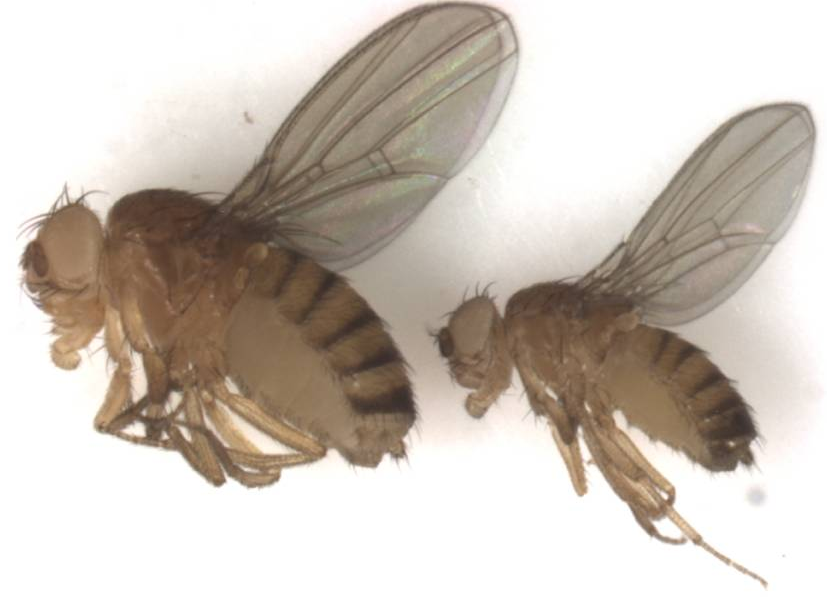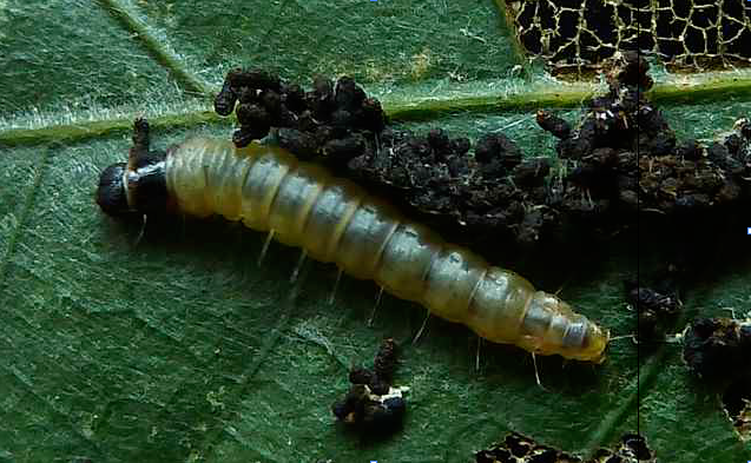|
Post by Erik Bergmann In last week’s blog post we looked into how small leaf-tying caterpillars have disproportionate impacts on other arthropod species by modifying their environment. In this week’s colloquium, the new Chair of the Department of Entomology, Dr. Leslie Pick, spoke about her research using another small insect, the humble fruit fly (Drosophilla malanogaster). This fly punches far above its weight class due to its use as a tool to conduct research in the fields of genetics, evolutionary and developmental biology, and even human medical research. Dr. Pick explained that Drosophila essentially is a lab rat, or a model organism. This fruit fly is so highly studied, providing detailed knowledge of the fruit fly’s genetics and development, that it can be used to understand phenomena in research on completely different organisms, like humans. Model organisms are an essential tool for scientists to conduct research that would otherwise be very difficult or impossible with more complex creatures. Dr. Pick and her students were able to identify sections of the fruit fly genome that control insulin and its function regulating sugar levels in their blood. By deleting different combinations of 5 peptides in the fly’s DNA that help with the uptake of sugar, Dr. Pick’s lab found a system that mimics diabetes in humans. They discovered that removal of these peptides didn’t cause instant death of the flies, as it would have in a mammalian species. Instead, they observed a drop in fly body fat, a drop in fertility, delayed development, and an increase in their blood sugar levels. Essentially, the removal of these insulin-like proteins causes the flies to be diabetic and proved that these fruit flies could be a potential model organism for diabetes research! Using this information, Pick’s group genetically modified flies with human genes that help to regulate insulin and sugar levels in human blood when fed a diet with varying levels of sugar. Surprisingly, the flies proved to be incredibly resilient and there was a high degree of conservation in maintaining constant levels of sugar in their blood. This is only the tip of the iceberg on this work with diabetic flies and Dr. Pick’s research. Want to know more about Dr. Pick, her lab, and their research? Click HERE to check it out! Erik Bergmann is a 3rd year MS student studying the feeding patterns of the brown marmorated stink bug, an invasive pest species now found nationwide, on woody ornamental plant species.
Post by Mayda Nathan For shy, cryptic animals that are – at their biggest –an inch long, leaf-tying caterpillars play an outsize role in the tree canopies where they live. Dr. Elisha Sigmon’s recent seminar highlighted the importance of the leaf and silk structures these caterpillars make, both for the caterpillars themselves and for hundreds of other arthropod species that live in forest trees in the Mid-Atlantic region. By fastening together overlapping leaves with silk, caterpillars create a shelter that protects them from predators and harsh climates. Dr. Sigmon’s work has shown that opportunistic insects and spiders quickly find these shelters and move in – even if the original caterpillar is still an occupant. On trees with leaf ties, arthropod abundance and richness can be 3 to 10 times higher than on trees without leaf ties. Just how much leaf ties boost arthropod abundance depends on the host tree species and on the time of year. When she created artificial leaf ties on white oak and beech trees, Dr. Sigmon found that although arthropod diversity within the leaf ties was similar across tree species, arthropod abundance was much higher on white oaks. As the experiment continued into late summer, insects and spiders continued to colonize the leaf ties, boosting arthropod abundance further. Other animals don’t randomly colonize leaf ties, however. After creating artificial leaf ties with and without resident caterpillars, Dr. Sigmon concluded that the composition of arthropods found in the leaf ties depended on the presence of a caterpillar. Specifically, the relative number of herbivores and predators was larger in leaf ties with caterpillars than in those without. What’s more, when she introduced “intruder” caterpillars to leaf ties that already contained a resident, Dr. Sigmon observed caterpillar battles – shoving, hitting, and drumming on the leaf surface. These miniature bouts are a rare documentation of direct interference competition between herbivorous insects, and they point to the leaf ties as an important resource for caterpillars and other arboreal arthropods in Mid-Atlantic forests. Beavers and corals are usually what come to mind when we consider the term “ecosystem engineer”, but the tiny leaf-tying caterpillars may well deserve that label, too. A link to Dr. Sigmon's most recent paper, via BioOne: http://www.bioone.org/doi/abs/10.1603/EN12064 About Mayda:
Mayda Nathan is a PhD student studying the consequences of species range shifts on plant-insect interactions. She currently works with insect pollinators of the black mangrove, which is expanding its range in northern Florida. |
Categories
All
Archives
April 2024
|
Department of Entomology
University of Maryland
4112 Plant Sciences Building
College Park, MD 20742-4454
USA
Telephone: 301.405.3911
Fax: 301.314.9290
University of Maryland
4112 Plant Sciences Building
College Park, MD 20742-4454
USA
Telephone: 301.405.3911
Fax: 301.314.9290




 RSS Feed
RSS Feed




